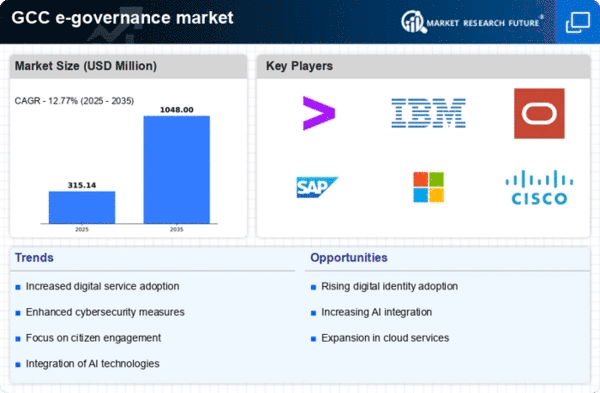Rising Demand for Transparency
The e governance market is experiencing a notable surge in demand for transparency in governmental operations. Citizens in the GCC region increasingly expect open access to information regarding public services and decision-making processes. This trend is driven by a growing awareness of the importance of accountability and the desire for improved public trust. As a result, governments are investing in digital platforms that facilitate information sharing and enhance citizen engagement. According to recent data, approximately 70% of citizens in the GCC express a preference for online access to government services, indicating a clear shift towards digital solutions. This rising demand for transparency is likely to propel the e governance market forward, as governments strive to meet the expectations of their constituents.
Collaboration with Private Sector
Collaboration between public and private sectors is emerging as a vital driver for the e governance market. Governments in the GCC are increasingly partnering with technology firms to leverage their expertise in developing innovative digital solutions. These collaborations can lead to the creation of more efficient and effective public services, as private companies often bring advanced technologies and best practices to the table. For instance, partnerships with tech giants have facilitated the development of cloud-based solutions that enhance data management and service delivery. This trend is expected to continue, with the e governance market projected to expand as more governments seek to harness the capabilities of the private sector to improve public administration.
Focus on Citizen-Centric Services
A shift towards citizen-centric services is reshaping the e governance market in the GCC. Governments are increasingly prioritizing the needs and preferences of citizens in the design and delivery of public services. This approach not only enhances user satisfaction but also encourages greater participation in governance processes. By leveraging digital platforms, governments can offer personalized services that cater to the unique needs of different demographic groups. Recent surveys indicate that around 65% of citizens prefer using mobile applications for accessing government services, highlighting the importance of mobile-friendly solutions. This focus on citizen-centric services is likely to drive innovation and investment in the e governance market, as governments seek to create more responsive and accessible public services.
Integration of Smart Technologies
The integration of smart technologies into public administration is significantly influencing the e governance market. Governments in the GCC are increasingly adopting technologies such as artificial intelligence, big data analytics, and the Internet of Things (IoT) to enhance service delivery and operational efficiency. These technologies enable real-time data analysis, which can lead to more informed decision-making and improved public services. For instance, the implementation of smart city initiatives in cities like Dubai and Riyadh is expected to streamline various governmental processes, thereby enhancing the overall citizen experience. The market for smart governance solutions is projected to grow at a CAGR of 15% over the next five years, indicating a robust potential for innovation within the e governance market.
Regulatory Framework Enhancements
The establishment of robust regulatory frameworks is a critical driver for the e governance market in the GCC. Governments are recognizing the need for clear guidelines and standards to govern the use of digital technologies in public administration. These frameworks not only ensure compliance with data protection and privacy laws but also foster trust among citizens. As regulatory bodies implement new policies, the e governance market is expected to benefit from increased investment in secure digital platforms. For example, the introduction of data protection regulations in the UAE has prompted many government entities to upgrade their digital infrastructure, thereby enhancing service delivery. This regulatory focus is likely to create a more conducive environment for the growth of the e governance market.
















